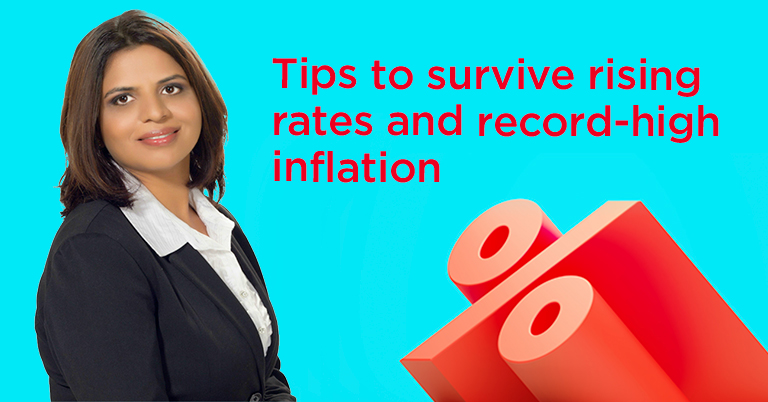The effects of inflation and rising rates are top of mind for homeowners in Brampton, Toronto and the GTA. After all inflation was 6.8% in April and 7.7% in May, Canada’s highest level in decades. Let’s look at how certain choices can help make sure you are prepared for what may be ahead.
First let’s look at your mortgage:
- If you have enough equity, refinancing is a possibility. If you need to get your monthly debt payments to the lowest possible amount because your high-interest credit card debt is choking your cash flow, you may want to consider refinancing (20% equity needed) so you can move that debt to a lower-rate mortgage for a cash flow boost. Since refinancing requires a new mortgage, you can also extend your amortization if you need further cash flow relief.
- Know your early payout penalty. If you are in a fixed rate mortgage and are considering getting out of it early for whatever reason, check out what prepayment penalty your lender will charge. This fee can be very onerous in certain situations so be sure to know what you are dealing with before you consider breaking your mortgage, since other options may be available.
- Think ahead to your mortgage renewal. If you are 18 months out from renewal, get in touch for advice. With rising rates comes a more difficult stress test, which is over 7% for some borrowers. This could limit many homeowners’ ability to shop around for a better rate at renewal and require that they take their lender’s best offer. If you get in touch early, we may be able to reorganize your finances so you can shop your mortgage for the best deal.
- If you have less than 20% equity, tighten your belt. Refinances to combine debt or to extend amortization are not possible if you have less than 20% equity. If you are on accelerated payments, you could consider going to non-accelerated to preserve a small amount of cash. Accelerated payments are a fantastic mortgage paydown strategy but if you need the extra dollars then now may not be the right time. Overall, my best advice is to review all expenses and do some belt tightening to help you get through until we start seeing interest rates heading back down.
Consider these common-sense tips to help you cut costs:
- Do a deep dive on your spending. Take a good hard look at your monthly bills and go through them line by line. Some may be for services you don’t use or can live without. Even if the amount is small, why have it charged every month? Then consider reining in what you spend:
- Watch out for impulse buys at grocery, gas station, convenience, and other stores.
- It’s best to always stick to a list, do meal planning, only grocery shop once a week and never when you are hungry.
- Pay more attention to sales and spread your shopping over the locations with the best deals on the items you want. Taking advantage of price matching is another smart way to save.
- Now may be a good time to look at your home and car insurance coverage. You may be surprised to find that you can find sizable monthly savings by switching to a new provider. Increasing your deductible is another way to lower your cost.
- Whether you are signing up for internet or buying a car, ask “is this your best offer?” or “can you make it more affordable?” Do research in advance so you are prepared and knowledgeable on all things related to what you are buying.
- Take your lunch to work and bring your home-made coffee in a thermos. Stop eating out.
- When you’re looking at your utility bills, investigate when off peak times are and consider using your appliances during these times.
- Grocery store points are a terrific way to help with future grocery needs. Credit card points can often be redeemed for cash back, travel discounts and more.
- Revisit (or start) your budget. Having a budget is one of the most important ways to manage your spending. It might not be the most thrilling task, but it’s one that will give you a clearer picture of where you stand and how much you can truly spend. The federal government has a very good budget planner that you can find here.
- Use cash instead. It’s a lot easier to spend more than you intend when you use your credit card because you aren’t seeing the money. You might not be so liberal with your cash if you must hand it over. Consider withdrawing a fixed amount for your weekly spending and try to stick to that amount.
- Build an emergency fund. Try to set aside a small sum from every paycheque for your emergency fund. This can be so helpful when your car breaks down or your fridge quits, and you don’t have to put the expense on your credit card. Try not to use your credit card as your emergency fund.
- Sell what you don’t need. You’ll also get the added benefit of decluttering which can help reduce stress.
- If possible, avoid new debt. New debt adds a new monthly payment to your budget and reduces your financial flexibility.
- Upgrade your skills. This is an excellent time to broaden your skill set so you can pivot your career if you need to or earn more money. Our job market continues to be strong so upgrading your skills can offer you a sizeable return. Also be sure to hone your networking skills. LinkedIn is a great resource for networking and job searching.
- Spend time, not money. We’ve all gained a new appreciation of the value of being able to spend time with loved ones in person. Focusing on this may keep you from spending money you might not have or might not want to spend!
If you’ve tightened all you can and you find that you are having difficulty making your mortgage payments, then be sure to get in touch with your lender as early as you can. It can be tempting to want to conceal your debt problem for as long as possible – but that’s almost never the best strategy. With early intervention, there may be options available to you. Your mortgage lender doesn’t want to see you default on your mortgage; they’d much rather help homeowners find a way to keep their home.
For mortgages insured by the Canada Mortgage and Housing Corporation (CMHC), they have identified several tools available to help you ride out a period of financial uncertainty. Sagen also has a Homeowner Assistance Program designed to help homeowners who are experiencing temporary financial difficulties that may put their mortgage at risk.
I am also available to have a conversation. As an independent mortgage professional, I work for my clients and look out for their best interests, not the lenders, and I know what the lenders are after.
If you are in Brampton, Toronto, or the GTA, please get in touch if you have any questions on the current economic climate and housing market, or on your mortgage strategy. I’m here to help! Contact me today.


